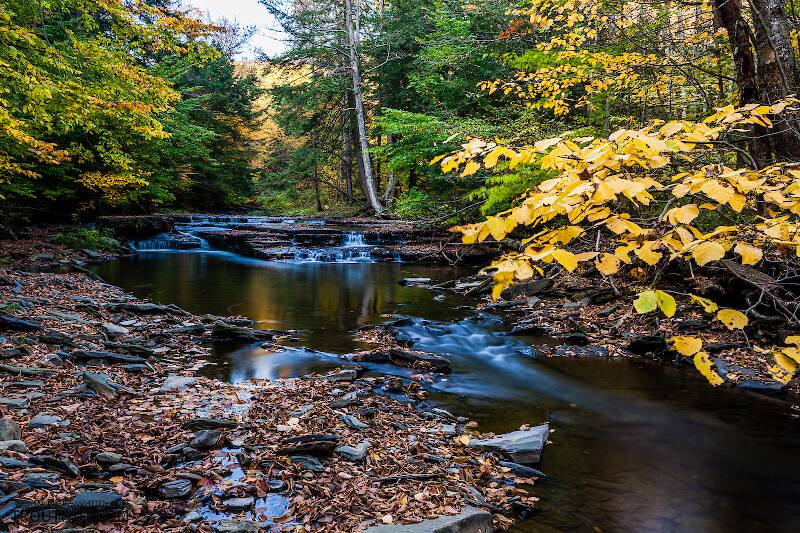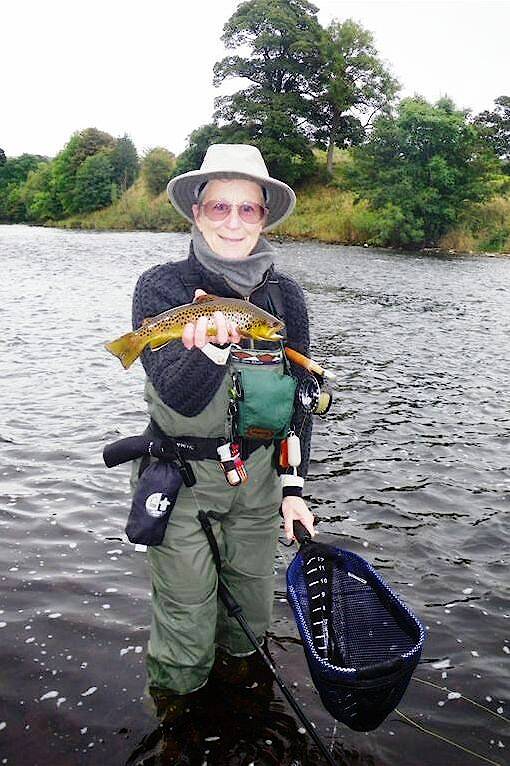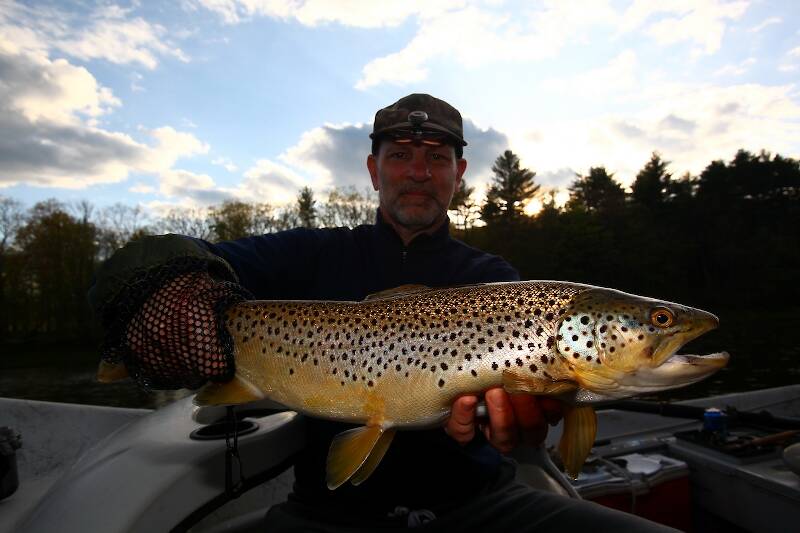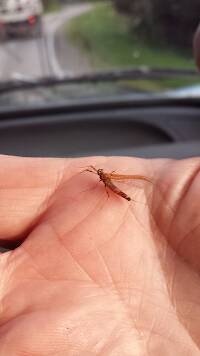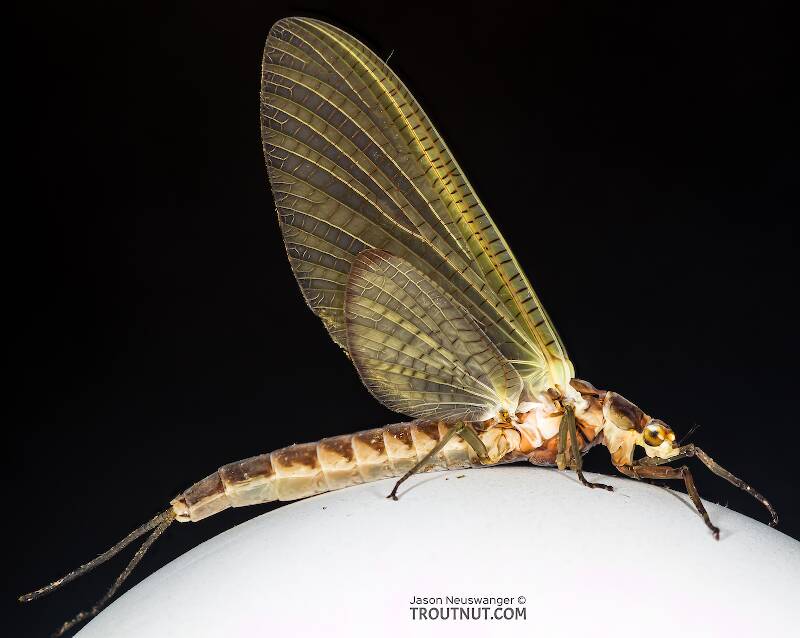
Hex Mayflies
Hexagenia limbata
The famous nocturnal Hex hatch of the Midwest (and a few other lucky locations) stirs to the surface mythically large brown trout that only touch streamers for the rest of the year.
Featured on the forum
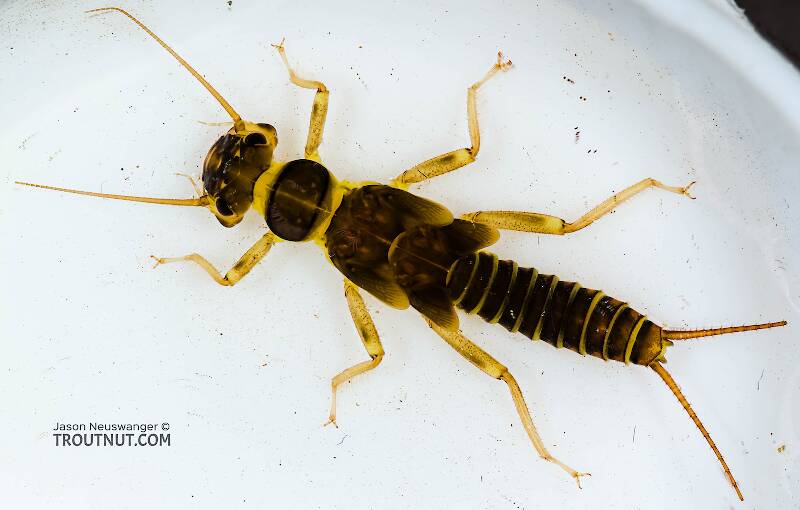
This one pretty clearly keys to Kogotus, but it also looks fairly different from specimens I caught in the same creek about a month later in the year. With only one species of the genus known in Washington, I'm not sure about the answer to this ID.

Troutnut is a project started in 2003 by salmonid ecologist Jason "Troutnut" Neuswanger to help anglers and
fly tyers unabashedly embrace the entomological side of the sport. Learn more about Troutnut or
support the project for an enhanced experience here.
CaseyP on Jun 14, 2007June 14th, 2007, 1:05 pm EDT
family event takes me to Yorkshire, England, in July. am using fishing to stay out from underfoot during inevitable hectic moments. will be staying at Addingham on the River Wharf and am excited to find real fishing right there at the bottom of the high street. questions:
what's going to be hatching? early? late?
flies to tie before going? Shawnny--help me here. have set aside the Altoids tin.
what's going to be hatching? early? late?
flies to tie before going? Shawnny--help me here. have set aside the Altoids tin.
"You can observe a lot by watching." Yogi Berra
Shawnny3 on Jun 14, 2007June 14th, 2007, 2:17 pm EDT
I've heard the English are fond of flies that catch fishermen rather than fish, so don't be without a few Victorian salmon flies just in case you have to show someone your flybox. I've also heard the English scorn anything modern or American, so you might want to leave anything synthetic behind, including perhaps your rod.
Or you could just take all your American flies and equipment with you and outfish everybody there.
-Shawn
P.S. I really hope there are no actual Englishmen on this board. I make my comments (like any good American) in ignorance and jest - I've known hardly any Englishmen and have never even been to Europe. That doesn't stop me from making fun of them (and, of course, the French) any chance I get - my students think these rants are amusing (even goading me into them), and I hope everyone here takes them in the right spirit.
P.P.S. If you've never read one of George Leonard Herter's rants about English flyfishing, I commend his books to you - funny stuff laced with enough truth to give it the air of credibility.
Or you could just take all your American flies and equipment with you and outfish everybody there.
-Shawn
P.S. I really hope there are no actual Englishmen on this board. I make my comments (like any good American) in ignorance and jest - I've known hardly any Englishmen and have never even been to Europe. That doesn't stop me from making fun of them (and, of course, the French) any chance I get - my students think these rants are amusing (even goading me into them), and I hope everyone here takes them in the right spirit.
P.P.S. If you've never read one of George Leonard Herter's rants about English flyfishing, I commend his books to you - funny stuff laced with enough truth to give it the air of credibility.
Jewelry-Quality Artistic Salmon Flies, by Shawn Davis
www.davisflydesigns.com
www.davisflydesigns.com
CaseyP on Jun 15, 2007June 15th, 2007, 3:53 pm EDT
...ah, scorn...lived four years in London and was astonished how much of it we encountered, right down to the local BBC evening news. matched only by the patronizing attitude of Yanks...let's just call it even!
thanks, Shawn. i won a funny box of showy flies at the local TU meeting recently, so i shall take the gaudiest, and won't forget the Tyro's Beetles that should earn me plenty of...yeah, well. a nice set of Louis' glowing spinners would take it right over the edge!
if anyone else has any advice, departure day is a month away. planning this is half the fun.
thanks, Shawn. i won a funny box of showy flies at the local TU meeting recently, so i shall take the gaudiest, and won't forget the Tyro's Beetles that should earn me plenty of...yeah, well. a nice set of Louis' glowing spinners would take it right over the edge!
if anyone else has any advice, departure day is a month away. planning this is half the fun.
"You can observe a lot by watching." Yogi Berra
Martinlf on Jun 16, 2007June 16th, 2007, 3:42 am EDT
The other day I saw a kid wearing a t shirt that said, "Heaven is where the cops are British, the mechanics German, the cooks Italian, the lovers French, and it's all run by the Swiss. Hell is where the cops are German, the mechanics French, the cooks British, the lovers Swiss, and it's all run by the Italians"--0r something like that. It all depends on perspective, I suppose. I found many of the English to be warm, helpful folks when I was there doing research years ago. Perhaps, Casey, you'll be lucky and run into some of the less stuffy people. Along with my American B&B roommate, I even ended up one evening at someone's flat playing strip drinking games with several attractive young Englishwomen we met in a bar. The result was relatively innocent--with most of us sitting around in our underwear very drunk, and that's all, I'm afraid. But I never sold the English short after that evening. Best of luck with those English browns, though. I hear they're tough even on glow spinners. I say, take all your secret weapons and use them, whatever anyone else says.
"He spread them a yard and a half. 'And every one that got away is this big.'"
--Fred Chappell
--Fred Chappell
GONZO on Jun 17, 2007June 17th, 2007, 8:00 am EDT
Casey,
On a more serious and practical note, I've looked at a book written by a Brit that gives extensive hatch information. I've tried to extrapolate what I can for the Yorkshire area, but my understanding is that the streams tend to be a little faster and rockier and often have easier fishing than the flat chalkstream ditches one often associates with English tradition. Caddisflies can be particularly important, and many classic soft-hackle patterns derive from that area. (And I can't vouch for the currency of the taxonomy or spelling in the book--not that it really matters.)
Mayflies:
I'd carry larger "sulphur" imitations for the Dusky Yellowstreak (Heptagenia lateralis) or Yellow May Dun (Heptagenia sulphurea). You'll most likely see these as evening/dusk hatches, and though they are two-tailed, I'm not sure if the Brit trout can count.
I'd also carry an assortment of BWO/Baetis imitations. Larger ones should cover Blue-Winged Olives like the classic Ephemerella ignita and larger baetids like B. tenax, venosus, and buceratus (collectively called the Medium Olives). Smaller ones in dark and light shades should work for little baetids like the Iron Blues (B. niger and muticus), Pale Watery Dun (B. fuscatus), and Small Dark Olive (B. scambus).
The large mayflies are probably going to require more specific patterns, though March Brown imitations should work for the Late March Brown (Ecdyonurus venosus) and maybe even for the Large Brook Dun (Ecdyonurus torrentis). Some large Green Drake imitations might work for the Large Green Dun (Ecdyonurus insignis) and the classic Mayflys (Ephemera danica and vulgata).
You might also see some Purple Duns (Paraleptophlebia cincta), and larger Blue Quill imitations might cover this one.
Caddisflies:
These might be more important, and I'd certainly try to have a good assortment of soft-hackles as well as just about any other caddisfly imitations you have.
Medium-size blackish imitations might work for the Black Sedge (Anthripsodes nigronervosus), the Black Silverhorns (Mystacides azurea and nigra), and the Brown Silverhorn (Anthripsodes cinerus).
Large reddish-brown or yellowish-brown imitations might work for the Cinnamon Sedge (Limnephilus lunatus), the Great Red Sedges (Phryganea striata and grandis), the Large Cinnamon Sedge (Potamophylax latipennis), and maybe even for the Mottled Sedge (Glyphotaelius pellucidus).
Medium-size Spotted Sedge and Green Sedge imitations might cover the Grey Flags (Hydropsyche instabilis and pellucida), the Marbled Sedge (Hydropsyche contubernalis), and the Sand Fly (Rhyacophila dorsalis).
Little yellowish- or reddish-brown flies might work for the Small Red Sedge (Tinodes waeneri) and Small Yellow Sedge (Psychomyia pusilla). Small yellow soft-hackles might be especially good for the latter.
I hope that helps, but I'd also throw in a Green Weenie, Honey Bug, or Woolybugger just out of PA spitefulness (provided there's no injunction against fishing subsurface).
Best wishes for a great time across the pond. I'm eager to hear how those snooty British trout respond to rebellious American flies and fly fishers. Should either the trout or trout fishers look down their noses at you or your offerings, just remind them (in the words of a favorite West Wing character) that "we opened a big can of whup-ass on you at Yorktown." ;)
Best,
Lloyd
On a more serious and practical note, I've looked at a book written by a Brit that gives extensive hatch information. I've tried to extrapolate what I can for the Yorkshire area, but my understanding is that the streams tend to be a little faster and rockier and often have easier fishing than the flat chalkstream ditches one often associates with English tradition. Caddisflies can be particularly important, and many classic soft-hackle patterns derive from that area. (And I can't vouch for the currency of the taxonomy or spelling in the book--not that it really matters.)
Mayflies:
I'd carry larger "sulphur" imitations for the Dusky Yellowstreak (Heptagenia lateralis) or Yellow May Dun (Heptagenia sulphurea). You'll most likely see these as evening/dusk hatches, and though they are two-tailed, I'm not sure if the Brit trout can count.
I'd also carry an assortment of BWO/Baetis imitations. Larger ones should cover Blue-Winged Olives like the classic Ephemerella ignita and larger baetids like B. tenax, venosus, and buceratus (collectively called the Medium Olives). Smaller ones in dark and light shades should work for little baetids like the Iron Blues (B. niger and muticus), Pale Watery Dun (B. fuscatus), and Small Dark Olive (B. scambus).
The large mayflies are probably going to require more specific patterns, though March Brown imitations should work for the Late March Brown (Ecdyonurus venosus) and maybe even for the Large Brook Dun (Ecdyonurus torrentis). Some large Green Drake imitations might work for the Large Green Dun (Ecdyonurus insignis) and the classic Mayflys (Ephemera danica and vulgata).
You might also see some Purple Duns (Paraleptophlebia cincta), and larger Blue Quill imitations might cover this one.
Caddisflies:
These might be more important, and I'd certainly try to have a good assortment of soft-hackles as well as just about any other caddisfly imitations you have.
Medium-size blackish imitations might work for the Black Sedge (Anthripsodes nigronervosus), the Black Silverhorns (Mystacides azurea and nigra), and the Brown Silverhorn (Anthripsodes cinerus).
Large reddish-brown or yellowish-brown imitations might work for the Cinnamon Sedge (Limnephilus lunatus), the Great Red Sedges (Phryganea striata and grandis), the Large Cinnamon Sedge (Potamophylax latipennis), and maybe even for the Mottled Sedge (Glyphotaelius pellucidus).
Medium-size Spotted Sedge and Green Sedge imitations might cover the Grey Flags (Hydropsyche instabilis and pellucida), the Marbled Sedge (Hydropsyche contubernalis), and the Sand Fly (Rhyacophila dorsalis).
Little yellowish- or reddish-brown flies might work for the Small Red Sedge (Tinodes waeneri) and Small Yellow Sedge (Psychomyia pusilla). Small yellow soft-hackles might be especially good for the latter.
I hope that helps, but I'd also throw in a Green Weenie, Honey Bug, or Woolybugger just out of PA spitefulness (provided there's no injunction against fishing subsurface).
Best wishes for a great time across the pond. I'm eager to hear how those snooty British trout respond to rebellious American flies and fly fishers. Should either the trout or trout fishers look down their noses at you or your offerings, just remind them (in the words of a favorite West Wing character) that "we opened a big can of whup-ass on you at Yorktown." ;)
Best,
Lloyd
CaseyP on Jun 17, 2007June 17th, 2007, 8:04 am EDT
oh, gee, Louis, please don't think we didn't make some really neat friends while in Old Blighty--some of the best! and yes, they have some nifty drinking games, which whiled away a memorable New Year's Day. this tyro feels a bit shy because no other nation takes its hobbies quite as much to heart. there is a Right Way, and other stuff that's Just Not Done that makes us colonials itchy.
and thanks to Gonzo for a great answer. exactly what i need. i have just gotten a couple of kits for emergers that allow for some adaptation without requiring different colored fur from a fox's patootie, and now i have an idea of the colors to aim for. those and some variations on a caddis and i'm good. really appreciate the research, sir.
and thanks to Gonzo for a great answer. exactly what i need. i have just gotten a couple of kits for emergers that allow for some adaptation without requiring different colored fur from a fox's patootie, and now i have an idea of the colors to aim for. those and some variations on a caddis and i'm good. really appreciate the research, sir.
"You can observe a lot by watching." Yogi Berra
GONZO on Jun 17, 2007June 17th, 2007, 8:27 am EDT
I'm sure that all the Brit-bashing is purely in good fun, Casey. I'm actually an Anglophile of sorts. I love Hardy reels (the older ones) and I admire many British angling traditions. (I even like some of their food, although Yorkshire pudding is pushing it a bit even for me). And I know that Louis has strong Anglophilic tendencies as well--after all, he is an English professor. (Notice that he uses "grey" and I like "sulphur.") Up the Brits! :)
PS--Shawn, I happen to know that there is a least one Englishman on the board--Paul Tooze (Ptooze). Still, I wouldn't worry; he seems like a very nice guy and tolerates our American foolishness. (Hell, he even said he liked my book!) ;)
PS--Shawn, I happen to know that there is a least one Englishman on the board--Paul Tooze (Ptooze). Still, I wouldn't worry; he seems like a very nice guy and tolerates our American foolishness. (Hell, he even said he liked my book!) ;)
Troutnut on Jun 17, 2007June 17th, 2007, 10:30 am EDT
Hell, he even said he liked my book!
Maybe they do have good taste across the pond!
I've always wanted to get over there and fish. I'm not much for tradition, though. It's fun to read about it, and it's fun to fish places steeped in history, but I've never been moved to tears by a piece of bamboo and I'm content to look at classic salmon flies rather than fish with them. Maybe when I'm old I will wax nostalgic about the good old days of carbon fiber rods and glow-in-the-dark spinners, while surrounded by weightless moon-mined rods and remote control nano-mechanical mayfly imitations.
On second thought, I doubt that. I'm such a technophile I would probably be pushing for remote control nano-mechanical mayfly imitations that glow in the dark...
Jason Neuswanger, Ph.D.
Troutnut and salmonid ecologist
Troutnut and salmonid ecologist
GONZO on Jun 17, 2007June 17th, 2007, 10:50 am EDT
I'm far from a Luddite, Jason, and I do enjoy the advantages of carbon-fiber rods and modern synthetic materials. (I admire bamboo rods, but I'm too accident-prone and impoverished to use them.) Still, I worry that if we don't start using our wonderful technology in wiser ways, we may be feeding nano-mechanical mayflies to nano-mechanical trout. Then fly-fishing would become nothing more than a 3D video game, and I'm sure even a hard-bitten technophile like you wouldn't be an advocate for that type of technological "advance." ;)
I remember talking to a very nice expatriot Brit at a local fly-fishing event who was thrilled by the freedoms we Yanks enjoy, particularly from a fishing standpoint. Many "public" waters are "coarse" fishing waters over there, and the wealth of trout and salmon fishing opportunities that we take for granted can often only be had by a select few or "leased" on the other side of the big pond. And this exclusive fishing can amount to casting dry-flies-only to stocked trout in a channelized ditch. Of course, even in our supposedly less class-conscious country, there are some who are working hard to turn many of our best waters into the same kind of exclusive and artificial situation. And that is not one of the British angling traditions I most admire. That fellow not only made me appreciate how lucky we are, but he also improved my pronunciation of Loch Leven. (He said it's pronounced like even with an L.)
I remember talking to a very nice expatriot Brit at a local fly-fishing event who was thrilled by the freedoms we Yanks enjoy, particularly from a fishing standpoint. Many "public" waters are "coarse" fishing waters over there, and the wealth of trout and salmon fishing opportunities that we take for granted can often only be had by a select few or "leased" on the other side of the big pond. And this exclusive fishing can amount to casting dry-flies-only to stocked trout in a channelized ditch. Of course, even in our supposedly less class-conscious country, there are some who are working hard to turn many of our best waters into the same kind of exclusive and artificial situation. And that is not one of the British angling traditions I most admire. That fellow not only made me appreciate how lucky we are, but he also improved my pronunciation of Loch Leven. (He said it's pronounced like even with an L.)
Shawnny3 on Jun 18, 2007June 18th, 2007, 5:38 am EDT
Glad to see someone had some actual good advice (thanks, Gonzo). I was just going to advise using your best general patterns to search, or do a little digging around the streambed when you get there and keep your eyes open for hatching bugs - basically, no advice at all. Glad that Gonzo knows something about the local insects - I'd do what he says.
-Shawn
-Shawn
Jewelry-Quality Artistic Salmon Flies, by Shawn Davis
www.davisflydesigns.com
www.davisflydesigns.com
Softhackle on Jun 18, 2007June 18th, 2007, 6:30 am EDT
Hi,
I'd have to vote along with Gonzo on the traditional soft-hackles and also the flymphs tied by Leisenring. Since many of these flies are in the "North Country" tradition of the Yorkshire area, they should work quite well. These flies are very versatile and can be fished both wet and semi-dry, upstream and down.
For more information look at these wonderful sites on English flies:
http://www.dtnicolson.dial.pipex.com/
I'd e-mail Donald if I were you and ask him about what to bring, tie or purchase regarding flies. He will definitely help you. I believe you can contact him through his site. If not get back to me, and I'll dig up his e-mail address for you.
My site at the following address also has many useful patterns that can be fished in the British Isles.
http://www.troutnut.com/libstudio/FS&S
I hope these help,
Mark
I'd have to vote along with Gonzo on the traditional soft-hackles and also the flymphs tied by Leisenring. Since many of these flies are in the "North Country" tradition of the Yorkshire area, they should work quite well. These flies are very versatile and can be fished both wet and semi-dry, upstream and down.
For more information look at these wonderful sites on English flies:
http://www.dtnicolson.dial.pipex.com/
I'd e-mail Donald if I were you and ask him about what to bring, tie or purchase regarding flies. He will definitely help you. I believe you can contact him through his site. If not get back to me, and I'll dig up his e-mail address for you.
My site at the following address also has many useful patterns that can be fished in the British Isles.
http://www.troutnut.com/libstudio/FS&S
I hope these help,
Mark
"I have the highest respect for the skilled wet-fly fisherman, as he has mastered an art of very great difficulty." Edward R. Hewitt
Flymphs, Soft-hackles and Spiders: http://www.troutnut.com/libstudio/FS&S/index.html
Flymphs, Soft-hackles and Spiders: http://www.troutnut.com/libstudio/FS&S/index.html
GONZO on Jun 18, 2007June 18th, 2007, 7:45 am EDT
Glad that Gonzo knows something about the local insects--I'd do what he says.
Thanks, Shawn, but I know next to nothing about the local (Yorkshire)insects. I did have a British resource, however, and I'm familiar enough with most of the genera to try to make some suggestions based on my experience with our Yankee versions. As for doing what I say, you should always remember that you do that entirely at your own peril. ;)
I'd suggest that Casey take Mark's advice, both about the soft-hackles and about getting help from someone who truly does know the local streams and insects. Advice from a diletante like me cannot possibly match information from someone who actually knows what he's talking about! (And especially from someone who speaks with a British accent. That always makes things sound much more impressive and authoritative to me.) :)
PS--Mark, I've always thought that the Halfordian traditions of Hampshire have mostly contributed to creating dry-fly snobbery over here. (Not to mention eventually driving my favorite British writer, G.E.M. Skues, from his beloved homewaters.) The North Country traditions, on the other hand, have given the world some of the most elegant and practical flies ever devised.
PPS--Nice site, Mark. (I especially like his disclaimer on the home page.) Have you seen this yet, Casey?
CaseyP on Jun 18, 2007June 18th, 2007, 1:52 pm EDT
oh. my. gosh...wow...who knew? and they don't look that complicated. (though simple doesn't ever mean easy.)
the internet never fails to amaze me with what you can find out about, but even more important is finding it, and for that we have this forum and its knowledgeable, patient, curious, and helpful posters.
ta, guys.
the internet never fails to amaze me with what you can find out about, but even more important is finding it, and for that we have this forum and its knowledgeable, patient, curious, and helpful posters.
ta, guys.
"You can observe a lot by watching." Yogi Berra
Softhackle on Jun 18, 2007June 18th, 2007, 2:18 pm EDT
Lloyd,
Yes, unfortunately the Halfordian influence on fly fishing, in general, was widespread until Len Wright shot it full of holes. The upstream, dead-drift technique still works, but to me dead drift is just that---dead. While I fish dries when they are called for, the wets, both winged and wingless are my favorites. To me action or movement shows that the fly is alive and I believe that's what the trout are looking for.
Don Nicolson is a very knowledgeable tier, and despite his disclaimer, ties some very nice flies. I believe I have at least one that we exchanged in a swap we did. I know Donald through corresponding with him online. We are both members of the International Brotherhood of the Flymph. This is a group of tiers and fly fisherman interested in the wingless wets and we carry on the tradition of Leisenring and Hidy. Donald's site is one of the most informative online references for English flies I've seen. They fish a lot more wets in England than we in America do. Of course, they like their dries, too. Ever look at any of Roy Christie's flies?
Casey,
Of the flies on my site I'd suggest you carry the Leisenring Spider, Hare Lug and Plover, Snipe and Purple, Light Snipe and Yellow, Tups Indispensible, Partridge and Orange. My Lil'Dorothy has taken many trout where I live, and I find it one of the best patterns from the end of May through June. I've often seen the sulfurs turn a distinct orange color at this time of year, and this fly does a nice job for them, also.
Yes, unfortunately the Halfordian influence on fly fishing, in general, was widespread until Len Wright shot it full of holes. The upstream, dead-drift technique still works, but to me dead drift is just that---dead. While I fish dries when they are called for, the wets, both winged and wingless are my favorites. To me action or movement shows that the fly is alive and I believe that's what the trout are looking for.
Don Nicolson is a very knowledgeable tier, and despite his disclaimer, ties some very nice flies. I believe I have at least one that we exchanged in a swap we did. I know Donald through corresponding with him online. We are both members of the International Brotherhood of the Flymph. This is a group of tiers and fly fisherman interested in the wingless wets and we carry on the tradition of Leisenring and Hidy. Donald's site is one of the most informative online references for English flies I've seen. They fish a lot more wets in England than we in America do. Of course, they like their dries, too. Ever look at any of Roy Christie's flies?
Casey,
Of the flies on my site I'd suggest you carry the Leisenring Spider, Hare Lug and Plover, Snipe and Purple, Light Snipe and Yellow, Tups Indispensible, Partridge and Orange. My Lil'Dorothy has taken many trout where I live, and I find it one of the best patterns from the end of May through June. I've often seen the sulfurs turn a distinct orange color at this time of year, and this fly does a nice job for them, also.
"I have the highest respect for the skilled wet-fly fisherman, as he has mastered an art of very great difficulty." Edward R. Hewitt
Flymphs, Soft-hackles and Spiders: http://www.troutnut.com/libstudio/FS&S/index.html
Flymphs, Soft-hackles and Spiders: http://www.troutnut.com/libstudio/FS&S/index.html
Martinlf on Jun 19, 2007June 19th, 2007, 4:14 am EDT
Mark, I always enjoy taking a look at your site. Thanks for redirecting me to it. Though I enjoy fishing those inert floating flies from time to time, I've been using wets more this year than before and they have provided me with some real heart-stopping experiences.
"He spread them a yard and a half. 'And every one that got away is this big.'"
--Fred Chappell
--Fred Chappell
Jwatersphd on Jun 23, 2007June 23rd, 2007, 2:41 pm EDT
you really ought to get oliver edwards's video essential skills czech nymphing and the northcountry spiders. he will show you how to tie and how to fish. there is a fair degree of emphasis on grayling which i have never seen in all my years of fishing but also on brown trout. i have to say that the tying techniques demonstrated there are incredible. jhw
jwatersphd
CaseyP on Jun 23, 2007June 23rd, 2007, 3:49 pm EDT
yeah, the web sites all mention two things i don't know about: "grayling" and "coarse" fishing. i think the former have small mouths and fight pretty well. i think the latter involves bait.
meanwhile, the flies don't take a minute to tie, except when the wax on my fingers gums up the hackle. they certainly have a minimalist grace to them. i'll certainly look for that video about how to fish them; might spare some frustration!
meanwhile, the flies don't take a minute to tie, except when the wax on my fingers gums up the hackle. they certainly have a minimalist grace to them. i'll certainly look for that video about how to fish them; might spare some frustration!
"You can observe a lot by watching." Yogi Berra
Quick Reply
Related Discussions
Topic
Replies
Last Reply
4
Feb 14, 2015
by Millcreek
by Millcreek
1
Apr 25, 2009
by Wiflyfisher
by Wiflyfisher

